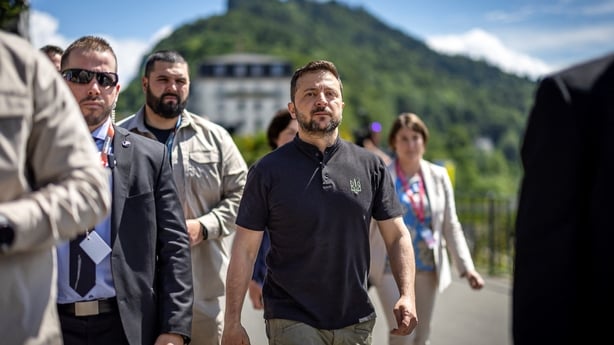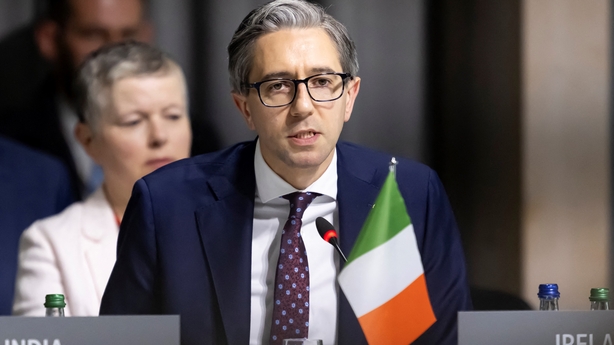Dozens of countries said that Ukraine's "territorial integrity" should be respected in any peace deal to end the war, as they said "dialogue between all parties" would be necessary for a lasting settlement.
In a final communique issued at the end of a major two-day diplomatic summit in Switzerland, the vast majority of countries also backed a call for the full exchange of captured soldiers and return of deported Ukrainian children.
But not all attendees backed the document, with India, Saudi Arabia and the United Arab Emirates among those not included in a list of supporting states displayed on screens at the summit.
Brazil, which was listed as an "observer" on the list of attendees, also did not feature as a signatory.
"We believe that reaching peace requires the involvement of and dialogue between all parties," the document stated.
It added: "We reaffirm our commitment to ... the principles of sovereignty, independence, and territorial integrity of all states, including Ukraine, within their internationally recognised borders."
We need your consent to load this rte-player contentWe use rte-player to manage extra content that can set cookies on your device and collect data about your activity. Please review their details and accept them to load the content.Manage Preferences
More than 90 countries, including Ireland, had gathered in the Swiss resort of Burgenstock for the summit, dedicated to discussing Kyiv's proposals for a route out of the conflict.
Moscow was not invited and has rejected the summit as "absurd" and pointless.
Ukraine had worked hard to secure attendance from countries that maintain warm relations with Russia.
The final document also called for all prisoners of war to be released in a "complete exchange" and for all Ukrainian children who had been "deported and unlawfully displaced" to be returned to Ukraine.
Ukraine accuses Russia of abducting almost 20,000 children from parts of the east and south of the country that its forces took control of.
Working groups at the summit also addressed the issues of global food security and nuclear safety.
"Food security must not be weaponised in any way," the declaration stated, adding that access to ports in the Black and Azov Seas was "critical" for global food supply.
And the countries also called for Ukraine to have "full sovereign control" over the Zaporizhzhia nuclear power plant.
Located in the south of Ukraine, the facility is Europe's largest nuclear energy site and has been controlled by Russian forces since early in the war.
The two-day talks at a Swiss Alpine resort was held at the behest of Ukrainian President Volodymyr Zelensky.

The summit had also hoped to name the host of another such meeting - possibly Saudi Arabia - but Austrian Chancellor Karl Nehammer said it was too early to say what format such a summit could take and whether Russia would be there.
Another intermediary conference without Moscow's participation might be needed, he said.
The Kremlin did not rule out future talks with Ukraine but said guarantees will be needed to ensure the credibility of any negotiations.
A source said it was unclear if Saudi Arabia would be announced at the summit as the next host for talks.
Leaders including US Vice President Kamala Harris, German Chancellor Olaf Scholz and French President Emmanuel Macron gathered at the mountaintop resort of Buergenstock in a bid to bolster international support for ending the war.
Many Western leaders voiced condemnation of the invasion and rejected Russian President Vladimir Putin's demands for parts of Ukraine as a condition for peace.
"The text is balanced, all of our principled positions on which Ukraine had insisted have been considered," Ukrainian Foreign Minister Dmytro Kuleba told reporters about the final communique to be issued later.
"Of course we...understand perfectly that a time will come when it will be necessary to talk to Russia," he said. "But our position is very clear: We will not allow Russia to speak in the language of ultimatums like it is speaking now."
Some leaders departed early, and talks today turned towards pursuing a joint position on nuclear and food security, and the return of prisoners of war and children removed from Ukraine during the conflict.

Mr Zelensky hailed the summit at the resort overlooking Lake Lucerne as a show of international support for Ukraine, even as some European allies said a broader outreach was needed.
Russia has poured scorn on the summit while China's decision to stay away dimmed hopes it would show Russia as globally isolated.
Norway gives €96m to Ukraine to secure electricity
Norway said that it would provide 1.1 billion kroner (€96m) to Ukraine to help repair its energy infrastructure and secure the country's electricity supply before next winter.
"Russia is carrying out massive, systematic attacks to paralyse the power grid, but Ukrainians are working day and night to maintain essential electricity supplies for the population," Prime Minister Jonas Gahr Støre said in a statement.
According to new estimates, more than 50% of Ukraine's power production capacity has been destroyed, the government said.
"We are in close dialogue with Ukraine on how it can use these funds most effectively. The Ukrainians themselves have the best insight into what is needed," Mr Støre said, adding that it was important to begin infrastructure repairs before the onset of winter.
Norway said it had already been decided that 120 million kroner would go toward repairs in the Kharkiv area, which has been hit particularly hard by Russian attacks recently.
Solar panels will be installed at seven maternity units and operating theatres in the Kharkiv area, Mr Støre said in the statement, which was issued as he attended the summit in Switzerland.
